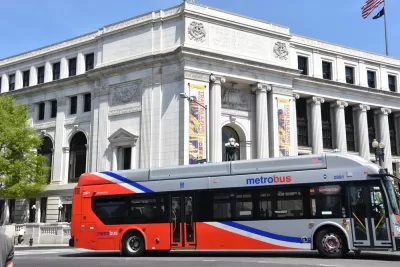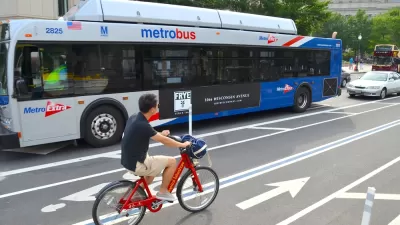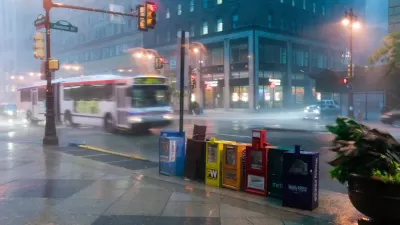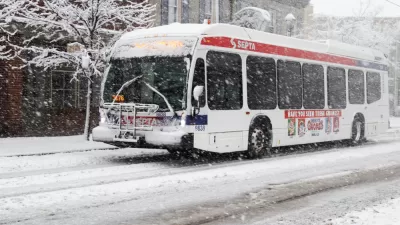A debate about how to more efficiently operate the Washington Metropolitan Area Transit Authority's bus service is underway.

A recent episode of the Kojo Nmamdi Show on WAMU in Washington, D.C. dug into proposed service reductions on the bus routes on the Washington Metropolitan Area Transit Authority (WMATA) system, as included in a fiscal year budget released in February.
Here the show's website explains the context for the show:
Last month, WMATA released their FY2021 budget. The transit authority is proposing consolidating or eliminating bus lines, in an effort to cut expenses. Dozens of bus lines across the region are in jeopardy of being cut or merged due to low ridership. Although these plans are not finalized, riders are protesting the cuts.
Guests on the show include Margaret Barthel, WAMU transportation reporter; Rob Puentes, chair of ENO Transportation and board member of the Bus Transformation Project; and Brian Turmail, chair of Advisory Neighborhood Commission 3B.
As explained in a February 7 article by Barthel, the WMATA is proposing the cuts as a mean to "reduce redundancy, make routes easier to understand and prune lines with low ridership." According to Barthel, "Metro also says the cuts will allow for better weekend service, increased bus frequency on some lines and free transfers between rail and buses. Eighteen lines also could have service expanded under the budget plans."
Barthel's coverage of the propose cut also includes soundbites from bus riders and local officials who oppose the service cuts.
A Planetizen article from May 2019 shares information about the plans by the Bus Transformation Project to improve bus service around the D.C. region. Opponents of the service cuts have claimed the proposed cuts are antithetical to the plan proposed by the Bus Transformation Project.
FULL STORY: WMATA Proposes Cuts to Dozens of Bus Routes. What’s Next?

Planetizen Federal Action Tracker
A weekly monitor of how Trump’s orders and actions are impacting planners and planning in America.

Maui's Vacation Rental Debate Turns Ugly
Verbal attacks, misinformation campaigns and fistfights plague a high-stakes debate to convert thousands of vacation rentals into long-term housing.

Restaurant Patios Were a Pandemic Win — Why Were They so Hard to Keep?
Social distancing requirements and changes in travel patterns prompted cities to pilot new uses for street and sidewalk space. Then it got complicated.

In California Battle of Housing vs. Environment, Housing Just Won
A new state law significantly limits the power of CEQA, an environmental review law that served as a powerful tool for blocking new development.

Boulder Eliminates Parking Minimums Citywide
Officials estimate the cost of building a single underground parking space at up to $100,000.

Orange County, Florida Adopts Largest US “Sprawl Repair” Code
The ‘Orange Code’ seeks to rectify decades of sprawl-inducing, car-oriented development.
Urban Design for Planners 1: Software Tools
This six-course series explores essential urban design concepts using open source software and equips planners with the tools they need to participate fully in the urban design process.
Planning for Universal Design
Learn the tools for implementing Universal Design in planning regulations.
Heyer Gruel & Associates PA
JM Goldson LLC
Custer County Colorado
City of Camden Redevelopment Agency
City of Astoria
Transportation Research & Education Center (TREC) at Portland State University
Jefferson Parish Government
Camden Redevelopment Agency
City of Claremont





























